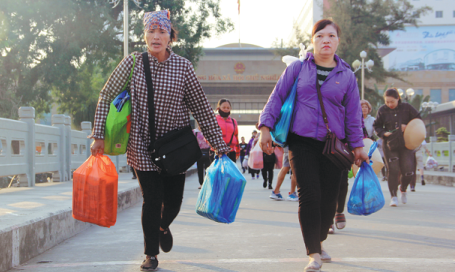Officers bridge commercial and cultural gap

Visitors from Vietnam cross Beilun Bridge to enter China. ZHAO YIMENG/CHINA DAILY
In February, Liao and his colleagues seized Sister Red, two other traffickers and 12 illegal immigrants in Dongxing.
"The three snakeheads, who all have Chinese husbands, ask their relatives in Mong Cai to find clients. They help the clients enter China, charging 50 yuan ($7.10) each if they are trafficked via deserted roads or 100 yuan if they arrive via isolated coastline where boats can dock unobserved.
"Some illegal immigrants head to Hainan province for work, because they can earn 3,000 to 3,500 yuan a month there. Back in their hometowns, they can only earn the equivalent of 1,000 to 1,200 yuan," Liao said. Snakeheads charge each person about 1,000 yuan for the trip from Vietnam to Hainan.
China's border authorities have taken several measures in response to the illegal entry and human trafficking of Vietnamese workers, including strengthening inspections at checkpoints and implementing a 24-hour duty roster for officers.
According to a report released by the Dongxing border office, the number of cases in the area under its jurisdiction has fallen by 60 percent in the past three years, and no crimes were reported on 193 days last year.
From 2016 to last year, Liao uncovered or assisted with 528 cases, helping to seize more than 7 kilograms of drugs, 13 guns, 74 bullets and a hand grenade.
In May 2017, Liao and his team tracked down the head of a Vietnamese gang who had fled across the border after shooting a man in his own country. He was hiding in an apartment in Dongxing when police broke in and arrested him.
His gang could not bear the fact that their big boss had been captured by a border police officer in the neighboring country, though, so they attempted to bribe Liao and his colleagues with 100,000 yuan. The offer was firmly rejected and the fugitive was handed over to the Vietnamese police.
"He is a dangerous person and it would be a great risk to keep him in our country. Bribery breaks the bottom line of law enforcement. I must stick to my duty," Liao said.
Liang, chief of the police station, said, "Before, border management had some loopholes in that there were not enough physical barriers or police officers, while the related policies didn't meet the needs of crossborder communication."
In recent years, the Dongxing government has introduced preferential policies to facilitate cross-border trade and encourage tourism between the two countries. Meanwhile, the police no longer just fight crime and ensure security; they also solve residents' day-to-day problems.
